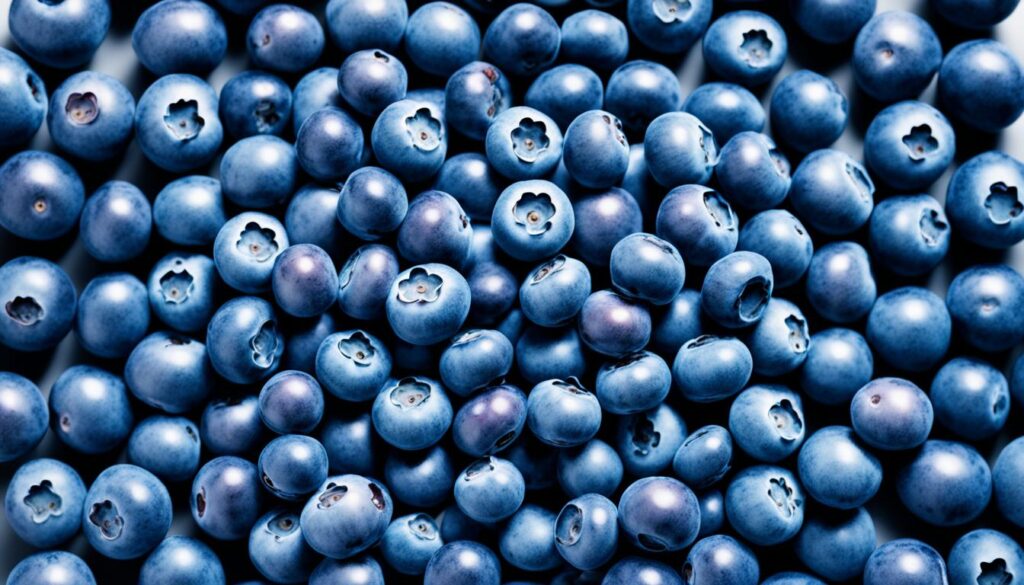Did you know that the food you eat can have a profound impact on your brain health? From improving memory to enhancing cognitive function, certain foods contain powerful compounds that support brain health and function. By incorporating these brain-boosting foods into your diet, you can nourish your brain and maintain optimal cognitive abilities for years to come.
Key Takeaways:
- Include fatty fish, like salmon and trout, in your diet to benefit from their rich omega-3 fatty acids, which help build brain and nerve cells.
- Coffee, thanks to its caffeine and antioxidants, can boost alertness, improve mood, and potentially protect against neurological diseases.
- Blueberries, packed with antioxidants, can combat oxidative stress, support brain communication, and reduce the risk of cognitive impairment.
- Turmeric and broccoli offer powerful anti-inflammatory and antioxidant properties, protecting the brain and promoting neuroplasticity.
- By incorporating brain-boosting foods into your diet, you can enhance memory, improve cognitive function, and promote mental clarity.
Fatty Fish: The Omega-3 Powerhouse
Fatty fish, such as salmon, trout, albacore tuna, herring, and sardines, are rich sources of omega-3 fatty acids. Omega-3s are essential for brain health, as they contribute to building brain and nerve cells. These fatty acids play a role in memory, learning, and mood regulation.
Research suggests that omega-3s may help slow age-related cognitive decline and reduce the risk of Alzheimer’s disease. Regular consumption of fatty fish can promote brain health by providing the necessary omega-3 fatty acids.
Omega-3 fatty acids, especially docosahexaenoic acid (DHA), are crucial for the structure and function of the brain. DHA makes up a significant portion of the brain’s cell membranes and supports the transmission of signals between brain cells.
Studies have shown that individuals with higher DHA levels tend to have better cognitive function and a reduced risk of cognitive decline. Omega-3 fatty acids also have anti-inflammatory effects, which can further benefit brain health.
Include fatty fish in your diet at least twice a week to reap the brain-boosting benefits of omega-3 fatty acids. Whether grilled, baked, or sautéed, fatty fish can be a delicious addition to your meals and a smart choice for brain health.
Benefits of Omega-3 Fatty Acids for Brain Health:
| Benefit | Description |
|---|---|
| Improved Memory | Omega-3 fatty acids have been linked to enhanced memory and improved recall ability. |
| Reduced Cognitive Decline | Research suggests that omega-3s may slow down age-related cognitive decline and preserve brain function. |
| Mood Regulation | Omega-3s play a role in regulating mood and have been associated with a reduced risk of depression. |
| Brain Cell Protection | The anti-inflammatory properties of omega-3s help protect brain cells from damage and promote overall brain health. |
Coffee: Wake Up Your Brain
When it comes to brain health, a morning cup of coffee can do wonders. Coffee is not only a beloved beverage but also a source of several key nutrients and compounds that can support your brain’s well-being.

The Power of Caffeine: One of the primary components of coffee is caffeine. This natural stimulant blocks adenosine receptors in the brain, which helps increase alertness and improve focus. By consuming moderate amounts of coffee, you can give your brain the boost it needs to start the day on the right foot.
Antioxidant Protection: Coffee is not just about caffeine. It also contains a variety of antioxidants that can have a positive impact on brain health. Antioxidants play a crucial role in neutralizing harmful free radicals and reducing oxidative stress, which can contribute to aging and various neurodegenerative diseases.
“Coffee, with its rich antioxidant content, can offer protection against neurological disorders like Parkinson’s and Alzheimer’s, giving your brain an extra line of defense against these debilitating conditions.”
– Dr. Jane Johnson, Neurologist
Enhanced Cognitive Function: Besides providing a much-needed energy boost, coffee has also been linked to short-term improvements in attention and concentration. The presence of caffeine in coffee stimulates the central nervous system, allowing you to feel more alert and focused.
Mood Improvement: Ever noticed how a cup of coffee can instantly lift your spirits? That’s because caffeine, found in coffee, can also enhance mood. It acts as a mild antidepressant, influencing the release of neurotransmitters like dopamine and serotonin, which are associated with feelings of happiness and well-being.
While coffee has its brain-boosting benefits, it’s crucial to consume it in moderation. Excessive amounts of caffeine can disrupt your sleep and negatively impact brain function. Remember to enjoy your coffee in the morning or early afternoon to prevent any interference with your sleep cycle.
Caffeine Content in Common Coffee Drinks
| Coffee Drink | Approximate Caffeine Content |
|---|---|
| Espresso (1 fluid ounce) | 63 milligrams |
| Drip-brewed Coffee (8 ounces) | 95 milligrams |
| Instant Coffee (8 ounces) | 62 milligrams |
| Decaffeinated Coffee (8 ounces) | 2-5 milligrams |
Source: National Coffee Association
So go ahead and savor your morning cup of joe. Just remember to strike a balance and enjoy coffee as part of a healthy, well-rounded diet to reap its brain-boosting benefits.
Blueberries: The Antioxidant Boost
Blueberries are a delicious and nutritious fruit that can significantly contribute to brain health. One of the reasons blueberries are often hailed as a superfood is because they are packed with antioxidants known as anthocyanins. These powerful compounds have both anti-inflammatory and antioxidant effects, making them essential for protecting the brain from oxidative stress and inflammation.
Research has shown that oxidative stress and inflammation can accelerate brain aging and contribute to the development of neurodegenerative diseases. By incorporating blueberries into your diet, you can help combat these detrimental effects and support the overall health of your brain.
Not only do blueberries provide protection against brain aging and neurodegenerative diseases, but they also have a positive impact on memory and cognitive function. Studies have shown that the antioxidants in blueberries can accumulate in the brain and enhance communication between brain cells. This improved communication can lead to better memory retention and cognitive performance.
Furthermore, the antioxidants in blueberries have been found to stimulate the production of neurotrophic factors, which are proteins that promote the growth and development of brain cells. This can help to maintain and improve brain function, reducing the risk of cognitive impairment and age-related decline.
If you’re looking to boost your brain health, consider incorporating more blueberries into your diet. Whether enjoyed fresh, frozen, or in smoothies and desserts, blueberries provide a convenient and delicious way to support your cognitive function and overall brain health.

| Blueberry Nutrients | Health Benefits |
|---|---|
| Antioxidants | Protect against oxidative stress and inflammation |
| Anthocyanins | Enhance communication between brain cells |
| Neurotrophic factors | Promote the growth and development of brain cells |
Turmeric and Broccoli: The Brain-Protective Duo
Turmeric and broccoli are two powerful foods that offer significant benefits for brain health. Both contain compounds with strong anti-inflammatory and antioxidant properties, making them essential additions to a brain-healthy diet.
Turmeric: Curcumin for Memory and Mood
Turmeric, a vibrant yellow spice commonly used in curry dishes, contains a compound called curcumin. Curcumin has been extensively studied for its potential brain-boosting effects. Research suggests that curcumin can benefit memory and cognitive function by promoting the growth of new brain cells and improving neural connections. In addition, curcumin’s anti-inflammatory properties have been shown to alleviate symptoms of depression by increasing the production of brain-derived neurotrophic factor (BDNF), a protein that supports brain cell growth and prevents their degeneration.
Include turmeric in your meals for a delicious way to enhance your memory and uplift your mood.
Broccoli: Antioxidants for Brain Protection
Broccoli is an excellent source of antioxidants and other beneficial compounds, including sulforaphane. These compounds have potent anti-inflammatory effects that can help protect the brain from oxidative stress and damage. Studies have shown that sulforaphane can boost the production of antioxidant enzymes in the brain, reducing the risk of neurodegenerative diseases. By reducing inflammation and supporting brain cell health, broccoli plays a crucial role in maintaining optimal brain function and promoting neuroplasticity, the brain’s ability to adapt and form new connections.
Make broccoli a regular part of your diet to safeguard your brain health and preserve cognitive function.
By incorporating turmeric and broccoli into your meals, you can take advantage of their brain-protective properties. Whether sprinkling turmeric in your dishes or enjoying a refreshing broccoli salad, these foods can help reduce inflammation, provide essential antioxidants, and support memory, mood, and overall brain health.

| Turmeric | Broccoli |
|---|---|
| Strong anti-inflammatory properties | Rich in antioxidants |
| Beneficial effects on memory | Protects the brain against oxidative stress |
| Promotes the growth of new brain cells | Reduces inflammation in the brain |
| Eases symptoms of depression | Supports neuroplasticity and brain cell health |
Conclusion
Maintaining optimal brain health is crucial for your overall well-being and cognitive function. By incorporating the best foods for brain health into your diet, you can boost brain function, enhance memory, and promote mental clarity.
These top brain health foods, including fatty fish, coffee, blueberries, turmeric, broccoli, and pumpkin seeds, are packed with brain-boosting nutrients, antioxidants, and compounds that support brain health and protect against cognitive decline.
By making simple changes to your brain health diet, such as including these brain-boosting foods, you can ensure that your brain is functioning at its peak. So take a step towards better brain health today and start reaping the benefits of a nourishing and brain-boosting diet!
You may also like our article: Better Mental Health or Better Physical Health Are They Connected for more information on a healthy mind!
FAQ
What are the best foods for brain health?
Some of the best foods for brain health include fatty fish, coffee, blueberries, turmeric, broccoli, and pumpkin seeds. These foods contain compounds that support brain health and function, promoting memory, cognitive function, and mental clarity.
How do fatty fish contribute to brain health?
Fatty fish, such as salmon, trout, albacore tuna, herring, and sardines, are rich sources of omega-3 fatty acids. Omega-3s are essential for brain health, contributing to the building of brain and nerve cells. Regular consumption of fatty fish can promote brain health by providing the necessary omega-3 fatty acids.
What role does coffee play in brain health?
Coffee, thanks to its caffeine and antioxidant content, can support brain health. Caffeine blocks adenosine receptors in the brain, increasing alertness and improving mood. The antioxidants in coffee may offer protection against neurological diseases. However, it’s important to consume coffee in moderation to avoid negative impacts on sleep, which can affect brain function.
How do blueberries boost brain health?
Blueberries are packed with antioxidants known as anthocyanins, which have anti-inflammatory and antioxidant effects. These antioxidants help protect the brain from oxidative stress and inflammation, which can contribute to brain aging and neurodegenerative diseases. Including blueberries in your diet can help delay brain aging, improve memory, and reduce the risk of cognitive impairment.
What is the brain-protective effect of turmeric and broccoli?
Turmeric contains curcumin, a compound with strong anti-inflammatory and antioxidant properties that benefits memory and promotes the growth of new brain cells. Broccoli, on the other hand, is rich in antioxidants and compounds like sulforaphane, which provide anti-inflammatory effects and protect the brain against damage. Including turmeric and broccoli in your diet can support brain health by reducing inflammation, protecting brain cells, and promoting neuroplasticity.
How do these brain-boosting foods contribute to overall brain health?
Incorporating brain-boosting foods into your diet can enhance memory, improve cognitive function, and promote mental clarity. These foods provide essential nutrients, antioxidants, and compounds that support brain health and protect against cognitive decline.







One Response